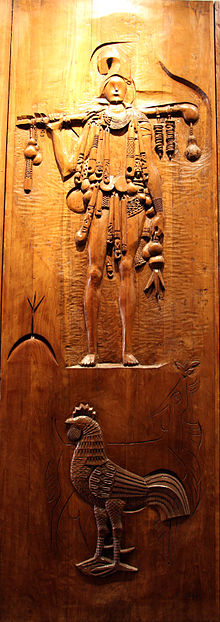Eṣu
Jump to navigation
Jump to search
See also: eṣu
Yoruba[edit]

Etymology[edit]
Possibly from è- (“nominalizing prefix”) + ṣù (“to bring together, to harmonize”), literally “The one who allows for coexistence”
- This is said to refer to the role of Èṣù as an intermediary between the evil and good forces of the universe.
Compare with Edo Èsù, Ede Idaca Èchù, Itsekiri Èṣù
Pronunciation[edit]
Proper noun[edit]
Èṣù
- The orisha and primordial divinity (irúnmọlẹ̀) of judgement, trickery, crossroads, and the messenger of Olódùmarè in the Yoruba religion. He is believed to epitomize the duality of goodness and malevolence, and is the intermediary between humanity and the evil forces, the Ajogun.
- (proscribed) Satan, the Devil
Usage notes[edit]
- Proscribed by Yoruba academics, linguists, and worshippers of the Yoruba religion, as the orisha is not equivalent to the figure Satan found in Abrahamic religions, and its use stigmatized worshippers of Èṣù as satanists, and by extension, perpetuated foreign stereotypes of Yoruba and other African indigenous religions. Alternatives presented include Sátánì and Bìlísì, directly loaned from the words for Satan in English and Arabic respectively.
Derived terms[edit]
- eléṣù (“a worshipper of Èṣù”)
- Èṣúbíyìí (“Yoruba name meaning, Èṣù gave birth to this child”)
- Èṣúkáyọ̀dé (“Yoruba name, meaning, Èṣù brings joy”)